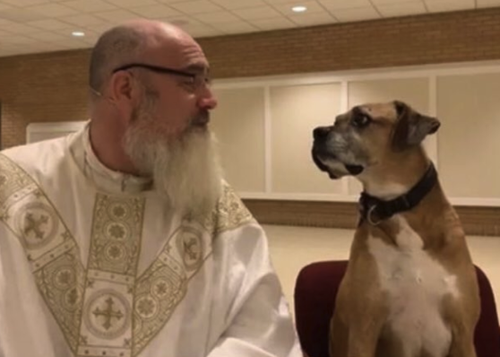Catholic priests are not used to hearing penitents laughing while lined up for confession.
When Father Joseph Krupp peered out of the booth one day, he saw that his broad-chested, 72-pound Boxer was in a chair and, when the line moved, the dog took the next chair.
Everyone knew this hound had sins to confess, after raiding wedding receptions, opening church fridges and, on one occasion, scarfing down a three-pound roast. Krupp laughs when describing how the latest of his rescue dogs "absolutely murdered" a rabbit – next to a statue of St. Francis of Assisi, patron saint of all creatures great and small.
The priest said he has intentionally adopted old dogs, hoping to "give them a few happy years. … I always thought that I was trying to heal the dogs. This time, God sent the dog to heal me."
This canine parable began during a tough stretch of the priest's work in a number of Michigan parishes. Krupp has served as chaplain for the Michigan State University football team, led the university Catholic campus ministry and now supervises the state's Northeastern deanery, with 12 parishes and four schools.
The priest went to the Hillsdale Humane Society eight years ago to donate a bed, toys and food after his latest dog died. Then he saw a battered, "broken-hearted" Boxer no one wanted.
"He was found tied to a tree, along with another dog. The other dog had died of starvation, and he was close to it. He had been shot with numerous pellets, his tail was broken, and a lot of his teeth were missing," wrote Krupp, to his many @JoeInBlack readers on X (formerly Twitter).
The dog was hours from death, but shelter workers saved him.
As Krupp arrived, a former student "sent me a message. She told me she was praying for me, and God told her that He was going to give me a remarkable gift that day. I walked in just as they were walking a dog out," he wrote. "He lifted his head, saw me and ran at me so hard and fast that the leash came out of the volunteer's hand. I sat on the floor, and he jumped on me, licking me and pushing me to the ground. I just couldn't quit laughing."










